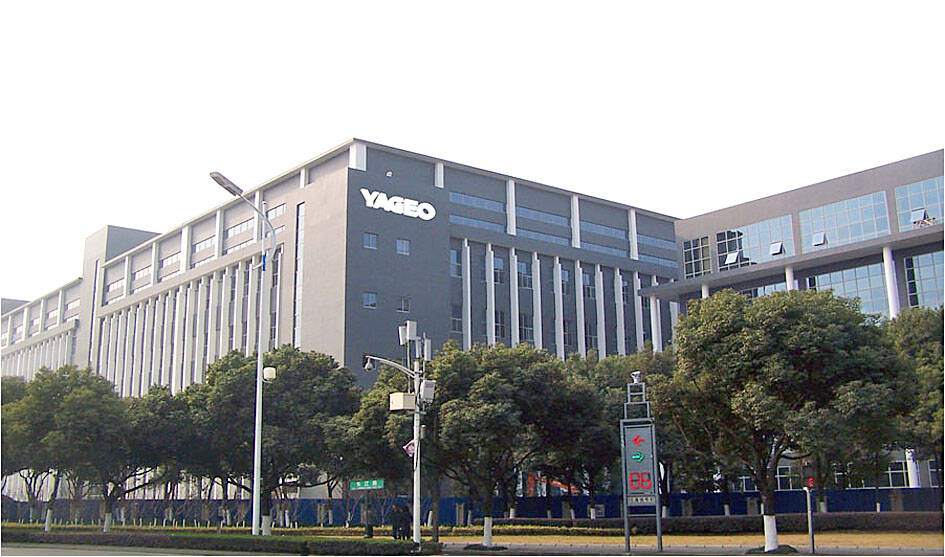Yaego Corp (國巨), the world’s No. 3 multilayer ceramic capacitor (MLCC) supplier, yesterday reported its weakest quarterly net profit in about four years, affected by sagging customer demand due to inventory correction and seasonal weakness.
Net profit last quarter sank 22.83 percent year-on-year to NT$3.65 billion (US$111.21 million) compared with NT$4.73 billion in the same period last year, hitting the lowest level since the third quarter of 2020.
On a sequential basis, net profit plummeted 35.4 percent from NT$5.65 billion in the third quarter last year.

Photo: Chang Hui-wen, Taipei Times
Earnings per share dropped to NT$7.1 from NT$9.43 a year earlier and NT$11.01 a quarter earlier.
Last year as a whole, Yageo still grew its net profit by about 11 percent to NT$19.36 billion from NT$17.43 billion in 2023. EPS rose to NT$38.18 from NT$37.74 in the prior year.
“This is probably the first time in the MLCC market’s history that we had back-to-back declining years. This is not something we or the industry was expecting,” Yageo executive vice president of global sales and marketing Claudio Lollini told a virtual investors’ conference.
However, the MLCC industry is “showing signs of improvement,” Lollini said. “And we can see that in our own book-to-bill [ratio]... Most of our products have positive book-to-bill [ratios], so we think the MLCC cycle is, hopefully, no longer on decline. I think we are beyond that. We’ll see some growth, but perhaps not very strong growth.”
Visibility on inventory levels from direct automotive and industrial customers is likely to remain low through this summer, he said.
Revenue this quarter would be little changed from the NT$30 billion made in the fourth quarter, the company said.
“Because of the Lunar New Year holiday, the first quarter is usually a low season, but we should be able to maintain the revenue [momentum] this time. Revenue would be flattish,” Yageo chief executive officer David Wang (王淡如) said.
“Our book-to-bill ratio now is higher than one. So, this is very, very positive,” Wang said. “Our distribution and channel inventory level is also very, very healthy, which is also very encouraging.”
Gross margin is expected to improve between 1.5 and 3 percentage points this quarter, from 33.2 percent last quarter, Wang said.
He attributed the improvement to increasing demand for artificial intelligence-related applications, computers, servers and consumer electronics from Asia, China, in particular.
Factory utilization is expected to drop to 70 percent for premium products and to 60 percent for standard products, from 75 percent and 65 percent last quarter, due to the long holiday, Wang said.
Factory utilization would improve quarter by quarter this year, he added.
Yageo said the US’ plan to hike tariffs is really a challenging issue as it is still evolving.
“However, largely speaking, I think we have good exposure in China, Mexico and Europe. And I think there is a decent split of our operations across different areas. So we’ll try to leverage that existence and try to make the best use of it,” Yageo chief financial officer Eddie Chen (陳彥松) said.
Yageo is not in a rush to adjust its global capacity before it gets a clear picture of the market situation, Chen said.

NO BREAKTHROUGH? More substantial ‘deliverables,’ such as tariff reductions, would likely be saved for a meeting between Trump and Xi later this year, a trade expert said China launched two probes targeting the US semiconductor sector on Saturday ahead of talks between the two nations in Spain this week on trade, national security and the ownership of social media platform TikTok. China’s Ministry of Commerce announced an anti-dumping investigation into certain analog integrated circuits (ICs) imported from the US. The investigation is to target some commodity interface ICs and gate driver ICs, which are commonly made by US companies such as Texas Instruments Inc and ON Semiconductor Corp. The ministry also announced an anti-discrimination probe into US measures against China’s chip sector. US measures such as export curbs and tariffs

The US on Friday penalized two Chinese firms that acquired US chipmaking equipment for China’s top chipmaker, Semiconductor Manufacturing International Corp (SMIC, 中芯國際), including them among 32 entities that were added to the US Department of Commerce’s restricted trade list, a US government posting showed. Twenty-three of the 32 are in China. GMC Semiconductor Technology (Wuxi) Co (吉姆西半導體科技) and Jicun Semiconductor Technology (Shanghai) Co (吉存半導體科技) were placed on the list, formally known as the Entity List, for acquiring equipment for SMIC Northern Integrated Circuit Manufacturing (Beijing) Corp (中芯北方積體電路) and Semiconductor Manufacturing International (Beijing) Corp (中芯北京), the US Federal Register posting said. The

India’s ban of online money-based games could drive addicts to unregulated apps and offshore platforms that pose new financial and social risks, fantasy-sports gaming experts say. Indian Prime Minister Narendra Modi’s government banned real-money online games late last month, citing financial losses and addiction, leading to a shutdown of many apps offering paid fantasy cricket, rummy and poker games. “Many will move to offshore platforms, because of the addictive nature — they will find alternate means to get that dopamine hit,” said Viren Hemrajani, a Mumbai-based fantasy cricket analyst. “It [also] leads to fraud and scams, because everything is now

MORTGAGE WORRIES: About 34% of respondents to a survey said they would approach multiple lenders to pay for a home, while 29.2% said they would ask family for help New housing projects in Taiwan’s six special municipalities, as well as Hsinchu city and county, are projected to total NT$710.65 billion (US$23.61 billion) in the upcoming fall sales season, a record 30 percent decrease from a year earlier, as tighter mortgage rules prompt developers to pull back, property listing platform 591.com (591新建案) said yesterday. The number of projects has also fallen to 312, a more than 20 percent decrease year-on-year, underscoring weakening sentiment and momentum amid lingering policy and financing headwinds. New Taipei City and Taoyuan bucked the downturn in project value, while Taipei, Hsinchu city and county, Taichung, Tainan and Kaohsiung